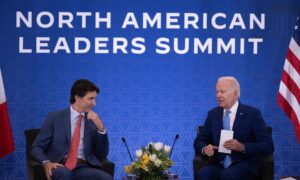World Looking to Canada for Critical Minerals as China Alternative, Says Trudeau
Prime Minister Justin Trudeau touted Canada’s mineral resources while visiting a new rare earth elements processing plant in Saskatoon, saying the country is the perfect alternative to China which has been dominating the market.“People are realizing that this extraordinary transformation that’s going on in our economy towards electric vehicles, towards more high tech, advanced solutions on everything we do, is going to require access to critical minerals and rare earth elements that to this point have been dominated by China as a somewhat challenging partner at the best of times,” Trudeau said at the Vital Metals plant. The prime minister said that world disruptions to supply chains in recent years, coming from U.S. protectionism, Russia’s invasion of Ukraine, or the pandemic have made the case for Canada becoming a bigger player in the mining industry. He said the “world is looking to Canada” because of its “incredible” amounts of rare earth elements and critical elements. “But on top of just having the elements, we have an incredibly strong workforce, well educated, ambitious, innovative thinkers, we have reliable supply chains and trade deals with the world,” he said. Natural Resources Canada says that Canada has some of the largest reserves in the world, estimated in 2021 at 14 million tonnes. Trudeau spent most of last week in Mexico City for the North American Leaders Summit and the critical minerals issue was reportedly discussed with U.S. President Joe Biden. The U.S. is seeking to reduce its reliance on China for the procurement of key resources and components An official from its Department of Defense said in November that Canadian mining projects would qualify for investments by the U.S. military in accordance with the Defense Production Act invoked by Biden in June 2022. China currently controls over 50 percent of global rare earth mining and a much higher proportion of processing and manufacturing. Rare earth elements have a variety of applications, including in electronics, vehicles, aerospace, and the defence industry. Trudeau said Canada’s environmental norms are also sought after by trading partners. “People don’t just want to be able to build things, they want to be able to build things and say that they’re done with clean steel, clean electricity, clean aluminum, clean critical minerals done in partnership, and with respect with indigenous peoples,” he said. The Vital Metals plant in Saskatoon processes rare earth elements mined at the Nechalacho project in the Northwest Territories. The federal government announced a $7.5 million interest free repayable contribution to Vital Metals in September to install equipment at its plant. The federal government announced its new critical minerals strategy in December, which aims in part to speed up the approval process for mining projects. Saskatchewan Premier Scott Moe said the province was not advised that Trudeau would be visiting the plant. Trudeau alluded to this being a signal sent to Moe for not seeing eye-to-eye on the energy transition. Noé Chartier is an Epoch Times reporter based in Montreal. Twitter: @NChartierET Gettr: @nchartieret

Prime Minister Justin Trudeau touted Canada’s mineral resources while visiting a new rare earth elements processing plant in Saskatoon, saying the country is the perfect alternative to China which has been dominating the market.
“People are realizing that this extraordinary transformation that’s going on in our economy towards electric vehicles, towards more high tech, advanced solutions on everything we do, is going to require access to critical minerals and rare earth elements that to this point have been dominated by China as a somewhat challenging partner at the best of times,” Trudeau said at the Vital Metals plant.
The prime minister said that world disruptions to supply chains in recent years, coming from U.S. protectionism, Russia’s invasion of Ukraine, or the pandemic have made the case for Canada becoming a bigger player in the mining industry.
He said the “world is looking to Canada” because of its “incredible” amounts of rare earth elements and critical elements.
“But on top of just having the elements, we have an incredibly strong workforce, well educated, ambitious, innovative thinkers, we have reliable supply chains and trade deals with the world,” he said.
Natural Resources Canada says that Canada has some of the largest reserves in the world, estimated in 2021 at 14 million tonnes.
Trudeau spent most of last week in Mexico City for the North American Leaders Summit and the critical minerals issue was reportedly discussed with U.S. President Joe Biden.
The U.S. is seeking to reduce its reliance on China for the procurement of key resources and components
An official from its Department of Defense said in November that Canadian mining projects would qualify for investments by the U.S. military in accordance with the Defense Production Act invoked by Biden in June 2022.
China currently controls over 50 percent of global rare earth mining and a much higher proportion of processing and manufacturing.
Rare earth elements have a variety of applications, including in electronics, vehicles, aerospace, and the defence industry.
Trudeau said Canada’s environmental norms are also sought after by trading partners.
“People don’t just want to be able to build things, they want to be able to build things and say that they’re done with clean steel, clean electricity, clean aluminum, clean critical minerals done in partnership, and with respect with indigenous peoples,” he said.
The Vital Metals plant in Saskatoon processes rare earth elements mined at the Nechalacho project in the Northwest Territories.
The federal government announced a $7.5 million interest free repayable contribution to Vital Metals in September to install equipment at its plant.
The federal government announced its new critical minerals strategy in December, which aims in part to speed up the approval process for mining projects.
Saskatchewan Premier Scott Moe said the province was not advised that Trudeau would be visiting the plant.
Trudeau alluded to this being a signal sent to Moe for not seeing eye-to-eye on the energy transition.












